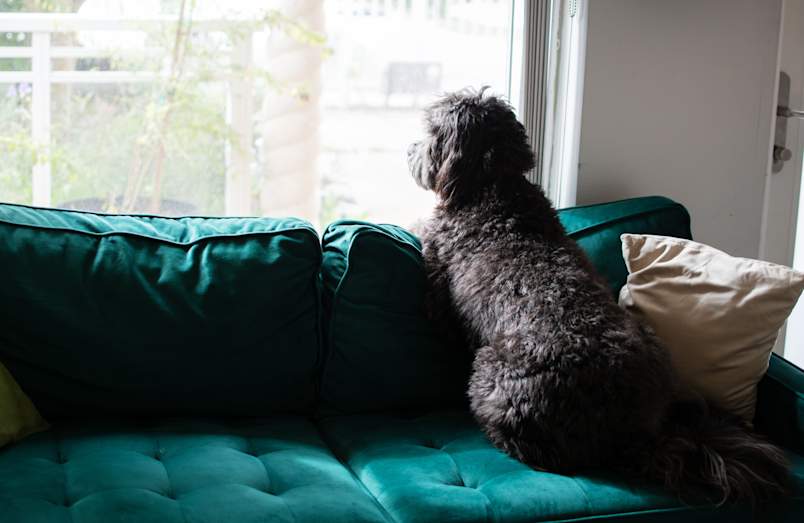
Does your furry friend suffer from anxiety during thunderstorms, car rides, or even when you leave the house? You're not alone. Many dogs experience anxiety, and it can manifest in barking, destructive behavior, or excessive whining. Fortunately, there are options to help your pup feel calmer and more secure.
Anxiety in dogs is an issue that is really coming to the forefront as we are starting to realize just how many dogs are affected by it. With this greater realization also comes a need for more ways to help treat it. One of those ways is with the use of trazodone. Trazodone can be part of a successful anxiety management plan for dogs with a wide range of anxiety triggers. To find out if trazodone may help your dog, speak to your veterinarian.
What is Trazodone for Dogs?
Before we can understand what trazodone is, we need to understand serotonin. Serotonin is a chemical that plays many important roles in the body by carrying messages from the brain. It has a hand in blood clotting, wound healing, digestion, sleep, and what we’re talking about here-mood. Serotonin helps you feel stable, happy, and calm. So, it should be no surprise that lower amounts of serotonin could have you feeling anxious, nervous, or fearful. The same is true for your dog. This is where trazodone comes it. It is known as a serotonin reuptake inhibitor, or a medication that prevents the uptake of serotonin, increasing the levels in the brain. Trazodone for dogs can be used to treat many conditions, including:
Separation anxiety
Situational anxiety related to travel, veterinary visits, groomer visits, boarding, etc.
Trazodone is particularly effective in managing situational anxiety in dogs, and it can be given as needed for these stressful situations.
What is the Trazodone Dosage for Dogs
The appropriate trazodone dosage for your dog depends on two key factors: their weight and the specific anxiety you're addressing. For short-term situations like thunderstorms or vet visits, your veterinarian can prescribe an "as needed" dose of trazodone to help your pup stay calm during these stressful events. For ongoing anxiety issues like separation anxiety, trazodone might be prescribed for daily use at a different dosage determined by your veterinarian. When used as needed, trazodone should be given about an hour before the fearful event is to take place and will last about 6-12 hours. When given long-term, it may take 1-2 weeks on the medication before you see a more relaxed dog. There are no veterinary formulations of trazodone, so veterinarians prescribe human version of it off-label. All this means to you is that you need to pay strict attention to your vet’s directions. Don’t alter the dose unless advised by a vet and monitor for any side effects.
Why We Aren’t Providing a Dosage Chart for Trazodone
Trazodone is a prescription medication; therefore, the dose should be determined by your veterinarian for your specific dog’s weight and condition. It’s tempting to want to handle these dosages yourself as a pet owner, but there can be some unexpected interactions and reactions to various prescription medications. We don’t want to provide a dosage chart because we don’t want to give any inaccurate information that could cause potential side effects or dosage problems. Consult your veterinarian for proper dosages and frequencies of trazodone for your dog.
How is Trazodone for Dogs Given?
Trazodone comes in a pill form of varying concentrations. For dogs that just won’t have a pill pushed down their throat or mixed in their food, veterinarians can have a liquid formula compounded. The liquid is often given a pleasing flavor, potentially making your pup more willing to take it.
Trazodone can be given with or without food but note that some dogs may get a little nauseous when taking it on an empty stomach. Providing a meal or a treat with their medication can help with this.
What are the Side Effects of Trazodone for Dogs?
Trazodone seems to be well tolerated in dogs at the proper dosage, and if dogs do show up with side effects, they are generally short lived. The most common side effects seen with trazodone in dogs are:
Vomiting/gagging
Sedation
Lethargy
Dilated pupils
Incoordination
Aggression
Most of these signs will clear up within 24 hours but be sure to report them to your veterinarian. Depending on the sign and severity, your vet may recommend another medication.
When giving the pill at the proper dose, there is very little risk of overdose with trazodone. A greater risk comes into play if you use the flavored liquid and don’t keep it locked away. Dogs may help themselves to this tasty treat, potentially causing severe side effects of incoordination or heavy sedation.

Does Trazodone Interact with Any Other Medications?
Before starting trazodone, be sure your vet is aware of any other medications or supplements that your dog is taking. Trazodone can potentially react with other antidepressants including MAO inhibitors. It should also be used with caution in dogs taking NSAIDS, antibiotics, heart medications, and pain medications.
Alternatives and Additional Treatments for Anxiety in Dogs
While trazodone can be helpful in calming your dog and potentially help stop a puppy from barking, it should be seen as a supportive player on an anxiety-managing team, working alongside behavior modification techniques. Instead of medicating your dog for every anxious moment, it’s important to try to instill calmness in your dog’s life through other methods as well.
The most commonly used training method for anxiety in dogs is desensitization and counterconditioning to expose dogs to their fears in bite-sized chunks and then praise and reward them for responding in a positive manner.
Another part of that training is to create a safe space for your dog. This may be a crate, room, or just a comfortable bed. Surround them with familiar and calming items and allow them to decompress in their own time.
Pet Insurance for Anxiety-Related Expenses
Trazodone can be a valuable tool in your dog's anxiety management plan. It can help alleviate symptoms and create a calmer environment for implementing other techniques like desensitization and counterconditioning, creating safe spaces, and consistent routine. These approaches are all crucial for your dog's well-being, but putting them into practice takes time and dedication.
Here's where things can get tricky. Sometimes, even with the best planning, your dog's anxiety might trigger unexpected veterinary visits. For instance, if a loud storm triggers their anxiety and they end up hurting themselves trying to escape, or if their anxiety manifests as digestive issues that require veterinary attention, these situations could necessitate a trip to the vet.
This is where getting a dog insurance quote comes in. It’s the first step toward finding comprehensive coverage for accidents and illnesses, including those that may be triggered by your dog’s anxiety. With pet insurance in place, you can focus on what truly matters: helping your furry friend feel calm and secure. This means you can confidently explore treatment options with your veterinarian, knowing you'll be covered for trazodone, diagnostic tests, or vet visits related to their anxiety, without the added stress of unexpected costs. Many plans even cover prescription medications, including anxiety medications.
Managing your dog's anxiety requires a multi-faceted approach. Medication like trazodone can be helpful, but techniques like desensitization and counterconditioning, creating safe spaces, and consistent routine are also crucial. These approaches often benefit greatly from professional guidance, and that's where considering an optional, non-insurance wellness plan can be a smart strategy.
These plans can help you budget for expenses like wellness visits and vaccinations, but here's the exciting part: this includes training! You can train your own pup, but some dogs may need a little extra help. In these cases, professional training may be in order. As you can imagine, the cost for professional training can be high, but these plans can help you budget for them.
Help Your Dog Find Calm: Managing Anxiety
Every dog deserves to feel calm and secure in their world. If your furry friend struggles with anxiety, there's hope! By creating a multi-faceted approach that combines medication, behavior modification techniques, and a proactive approach to preventative care, you can create a supportive environment to help them manage their anxiety.
Trazodone Frequently Asked Questions
How quickly does trazodone take effect in dogs?
For short-term use, you should see calming and mild sedation 1-3 hours after giving trazodone. For long-term administration, it may take a couple of weeks to see the desired effects.
Is it safe to give a dog trazodone every day?
For some dogs with certain anxieties, trazodone may be prescribed as a daily medication. Your veterinarian will best determine the dose and frequency depending on your dog’s condition.
What happens if I give my dog too much trazodone?
If your dog gets more than the recommended dosage of trazodone, you may see vomiting, incoordination or heavy sedation. Contact your vet immediately.
Why is my dog shaking after trazodone?
Some dogs may experience nausea or incoordination when taking trazodone. This is more common in higher doses but can happen to any dog. Talk to your vet about these issues to determine if you need to make any changes.
Can trazodone cause diarrhea in dogs?
Some dogs may experience diarrhea and vomiting on trazodone. Report any side effects to your vet.